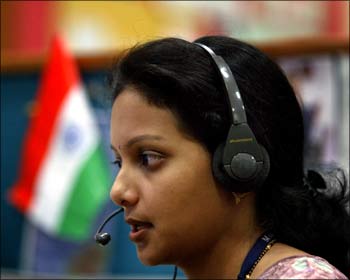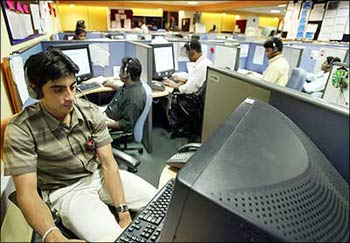Photographs: Reuters Andre Dua, Sam Marwaha and Ranjit Tinaikar
The raging political firestorm over how to reform the US's $2.5-trillion healthcare sector might seem to be of limited relevance to India.
But for the Indian IT services sector, the Obama-led revolution might just present an exciting growth opportunity.
Taking advantage of what we believe in will be a multi-billion dollar opportunity that requires immediate mobilisation and mastery of the intricacies of the US healthcare system.
President Obama's new healthcare plan aims for universal coverage for every US citizen, massive system-wide cost reductions and significant improvements in the quality of care and health outcomes.
Some of the reform measures under consideration include the creation of non-profit cooperatives to promote competition for lower health insurance rates, the setting up of health insurance exchanges so consumers can shop for the best plans, and a mandate that all individuals must buy insurance (with subsidies for low-income people).
Regardless of which specific change is enacted into law, we will most likely see a significant influx of "the newly insured" into the healthcare system as well as tremendous pressure on insurers and healthcare providers to reduce the cost of coverage and care.
US's multi-billion-dollar lure for Indian IT giants
Image: Doctors performing an operation on a patient.Photographs: Reuters
The US healthcare reform creates three opportunities for Indian companies: providing IT services to support implementation of electronic healthcare records (EHRs), business process outsourcing (BPO) to reduce costs and give the capacity required for payers to serve the newly insured, and data analytics services to support fact-based decision-making throughout the healthcare system.
As a major down-payment on his healthcare effort, President Obama allocated $37 billion of stimulus funding to drive the adoption of EHRs. McKinsey estimates the resulting growth in EHRs will require an overall spend of $175 billion over the coming decade, of which nearly $50 billion will be devoted to IT services and training.
The implementation of EHRs will generate pressing time-bound demands for IT services. While adopting the EHR system, hospitals will need help in system set-up, installation, beta-testing, conversion of archival data into compatible formats and heavy initial training of clinical and administrative staff to use the new system.
Indian IT firms are well positioned to succeed in the EHR market because established EHR software vendors lack the manpower to install and implement the system on a national scale, and also provide service and support on an ongoing basis.
US's multi-billion-dollar lure for Indian IT giants
Image: An Indian BPO worker.Photographs: Reuters
In addition, Indian IT firms already have deep expertise in services such as systems integration, application management and legacy modernisation. This expertise will be badly needed in the EHR rollout.
The second big opportunity for Indian firms lies in BPO. The reform will see an influx of over 30 million newly covered individuals; insurers will look to outsourcing partners to help them enroll new members and process their call and claim needs.
Additionally, rising cost pressures will force insurers and hospitals to concentrate only on a few core functions (such as benefit and services design, sales and marketing) and outsource back-office (member database management, claims processing) and support services (enrolment processing).
Payers, in particular, are seeking efficiencies beyond automation (claims autoadjudication, call IVR, web self-serve) and increasingly looking to BPO companies to meet their more complex services, such as medical management and wellness outreach, that are not readily automated.
The third opportunity for Indian firms centres on the emerging market for data analytics. Together with claims data, EHRs will generate enormous amounts of 'real world data' to drive large-scale healthcare analytics.
US's multi-billion-dollar lure for Indian IT giants
Image: An Indian call centre in Bangalore.Photographs: Reuters
These could range from comparative effectiveness research into different treatments or drug combinations to analysis of call, claims and clinical data for customer lifecycle needs and marketing. McKinsey estimates that the overall market for 'real world data' analytics could be worth over $10 billion.
Moreover, data-driven services will likely be both high-growth and high-margin activities. Thus, while such analysis has not been core for many Indian IT firms, it represents a natural progression for a mature and self-confident technology sector.
In fact, each of the three main healthcare openings -- EHR, BPO and data analytics -- plays to both the strengths as well as the ambitions of India's technology tigers. Yet, to win share in the highly competitive healthcare space, Indian firms need to move quickly on several fronts.
First and the foremost, firms should act now to make contingent business plans in healthcare. Speed is critical since many of the promising healthcare openings are highly perishable. Hospitals are already racing to meet strict government deadlines to implement the EHR system or face financial penalties.
US's multi-billion-dollar lure for Indian IT giants
Image: An Indian IT company complex.Photographs: Rediff Archive
Given the two-three year rollout period for EHRs, large contracts will be awarded within the next 12-24 months. Similarly, the reform to extend insurance coverage to everyone is likely to be signed into a law by early 2010, with the newly insured expected to finalise their choice of health plans within a six-twelve month window.
However, speed without insight could prove expensive and fruitless. Ambitious players need to develop a deep understanding of the needs and intricacies of the US healthcare landscape. Health insurers and hospital administrators typically expect a high degree of industry knowledge from their contracting counterparts.
For an Indian technology firm, this might translate into hiring key individuals, or partnering with existing players with the requisite domain expertise.
While notable exceptions do exist, Indian companies do not enjoy a long track record in healthcare. This means they need to quickly establish their reputation and credentials in this fast-evolving space either through partnerships with established insurers and hospital networks, or by making very competitive proposals for high visibility contracts.
US's multi-billion-dollar lure for Indian IT giants
Image: Workers at an Indian IT firm's office.Photographs: Reuters
Another key element of success is to devise an operational set-up that appropriately balances offshore and onshore locations to optimise value as well as service. While many back-office functions can be sent offshore, most of the front-office, patient and physician functions will need to be delivered from onshore locations.
The above challenges are real but possible to meet. India's technology firms surmounted similar obstacles in cultivating America's captains of finance during the 1990s.
Now, they must bring a similar mix of ingenuity and tenacity to bear on the country's doctors, insurers and hospital administrators. A success will mean a strong foothold for Indian IT companies in America's one economic sector--healthcare--that is truly evergreen and resilient in its spends through recessions as well as boom years.
Additional reporting with Sam Marwaha and Ranjit Tinaikar.
(Andre Dua is a partner and Sam Marwaha a director at McKinsey based in New York, while Ranjit Tinaikar is a partner based in Mumbai.)








article